
Discourse on Method and Meditations on First Philosophy
Book Description
Amid the fog of uncertainty, one man's quest for truth sparks a revolution in thought. René Descartes boldly navigates the treacherous terrain of doubt, carving a path from chaos to clarity in 'Discourse on Method and Meditations on First Philosophy.' With piercing insights and relentless introspection, he dismantles old beliefs, laying the foundation for modern philosophy. Each revelation shatters comfortable assumptions, urging minds to awaken and question everything. What if the very act of thinking is the key to unlocking reality? Dive into the depths of profound inquiry and discover the power of doubt—can you dare to doubt your own existence?
Quick Book Summary
René Descartes’ "Discourse on Method and Meditations on First Philosophy" is a foundational text in modern Western philosophy. In these works, Descartes revolutionizes the quest for knowledge by systematically doubting all previously held beliefs. Through radical skepticism, he seeks firm ground for science and reason, ultimately asserting that the act of thinking itself – captured in the famed phrase "Cogito, ergo sum" (I think, therefore I am) – is the first undeniable truth. Descartes then reconstructs knowledge by contemplating the existence of God, the mind-body distinction, and the nature of reality itself. His meditations not only shake the intellectual foundations of his era but also inspire enduring debates about consciousness, perception, and the relationship between mind and world.
Summary of Key Ideas
Table of Contents
Radical Doubt and the Search for Certainty
Descartes opens the "Discourse on Method" by recounting his dissatisfaction with conventional learning and his resolve to establish a more reliable path to knowledge. He proposes that to achieve certainty, one must undertake a process of methodical doubt—questioning every belief that could possibly be false. This radical doubt leads him to temporarily withhold assent from all his prior convictions, effectively clearing the intellectual slate so that only indubitable truths can provide a foundation for real knowledge.
The Cogito and the Foundations of Knowledge
As Descartes examines his thoughts, he realizes that while all else may be doubted—even the external world and his own bodily existence—the very act of doubting presupposes a thinking subject. This is crystallized in the famous principle "Cogito, ergo sum"—I think, therefore I am. Through this realization, he establishes self-awareness as the first certitude, an unassailable point from which he can reconstruct knowledge. The cogito becomes the bedrock of the philosophical system he intends to build.
Proof of God and the Reliability of Reason
Having discovered this secure footing, Descartes investigates whether it is possible to know anything else with equal certainty. He considers the reality of God, arguing that the idea of a supremely perfect being must have a cause as real as the idea itself. This, in his view, necessitates the existence of God. Descartes further holds that God, as a perfect being, would not deceive humans; this guarantee enables him to trust the clarity and distinctness of his perceptions, thereby allowing for genuine knowledge of the world.
Mind-Body Dualism and the Nature of Reality
The relationship between mind and body becomes a central theme in the Meditations. Descartes posits the famous mind-body dualism: the mind is a thinking, non-extended substance, while the body is an extended, non-thinking substance. This distinction sets the stage for modern debates about consciousness and personal identity, as Descartes grapples with how these two substances interact and what it means to be a human being experiencing both thought and sensation.
Implications for Science and Philosophy
Descartes’ revolutionary method and meditations profoundly influence the development of modern science and philosophy. By prioritizing individual reason and systematic skepticism, he ushers in a new era in which inherited beliefs are scrutinized and empirical investigation is paramount. His arguments invite ongoing inquiry into the nature of knowledge, the limits of certainty, the role of science, and the enduring mystery of the relationship between the mental and the physical.
Download This Summary
Get a free PDF of this summary instantly — no email required.





